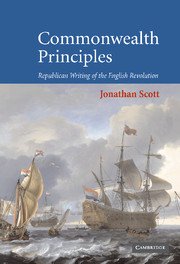2 - The cause of God
Published online by Cambridge University Press: 22 September 2009
Summary
Shalt thou give law to God, shalt thou dispute
With him the points of liberty, who made
Thee what thou art?
John Milton, Paradise Lost Book V, lines 823–5.God is our … only lord, because he only hath created us. If any other were equal to him in wisdom, power, goodness, and beneficence to us, he might challenge the same duty from us. If growing out of ourselves, receiving being from none, depending on no providence, we were offered the protection of a wisdom subject to no error, a goodness that could never fail, and a power that nothing could resist, it were reasonable for us to … submit ourselves to him … But what right can from hence accrue to a mortal creature like to one of us, from whom we have received nothing, and who stands in need of help as much as we?
Algernon Sidney, Discourses Concerning GovernmentINTRODUCTION
In England, as in the United Provinces, republicanism was one product of a struggle for not only political, but religious freedoms. Yet despite this shared context in early modern Europe's wars of religion, and the actual (if incomplete) achievement of Dutch liberty of conscience, the fundamental premises of the Dutch republican ideology of ‘true liberty’ were economic rather than religious.
- Type
- Chapter
- Information
- Commonwealth PrinciplesRepublican Writing of the English Revolution, pp. 41 - 62Publisher: Cambridge University PressPrint publication year: 2004



